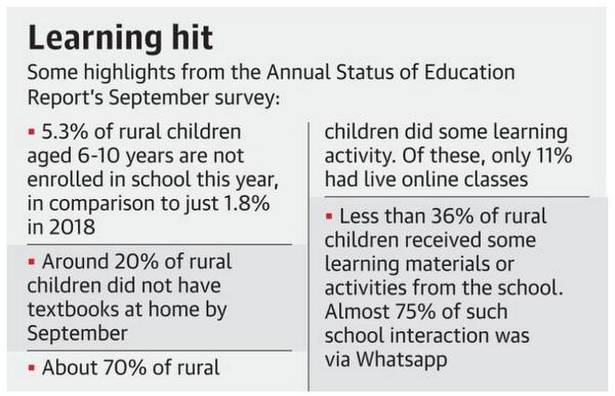ASER Survey
What’s in the news?
- NGO Pratham has released its latest Annual State of Education Report (ASER) survey conducted in September, the sixth month of school closures due to COVID-19 across the country.
- ASER is a nationwide survey of rural education and learning outcomes in terms of reading and arithmetic skills that has been conducted by the NGO Pratham for the last 15 years.
- This year, the survey was conducted via phone calls, reaching 52,227 rural households with school age children in 30 States and Union Territories.
Highlights of the survey

Shift toward government schools
- The ASER survey provides a glimpse into the levels of learning loss that students in rural India are suffering, with varying levels of access to technology, school and family resources resulting in a digital divide in education.
- ASER 2020 shows that 5.5 per cent children are not currently enrolled for the 2020-21 school year, up from 4 per cent in 2018. This difference is the sharpest among the youngest children (ages 6 to 10), possibly because they have not yet secured admission to school.
- Enrolment patterns also show a slight shift toward government schools, with private schools seeing a drop in enrolment in all age groups.
Smartphone penetration
- Among enrolled children, more than 60% live in families with at least one smartphone. This proportion has increased enormously in the last two years, from 36.5% to 61.8% among enrolled children.
- Despite the high smartphone penetration, only about one-third of them reported getting some form of learning material from their teachers in the week preceding the survey.
Family support
- Yet, most children (70.2 per cent) said they did some form of learning activity that week through material shared by tutors or family members themselves.
- Almost 75 per cent of children said they received some form of learning support from family members, with older siblings playing a key role. ASER recommended that schools find ways to build on this home support going forward.
- This kind of support was evident even among children whose neither parent has studied beyond primary school, though children with more educated parents received more support.
Way forward
- Plan remedial measures: The ASER survey provides data that could facilitate intervention by the education system and prompts the Centre and the State governments to plan remedial measures for the future.
- Expanding availability of textbooks : Expanding availability of textbooks to all, including those who dropped out or are waiting to be formally admitted, will help parents and siblings aid learning.
- Bridging digital divide: Bridging the divide on educational aids, now including smartphones, will enable transmission of learning materials, and personal tutorial sessions.
- Promote observational learning: The education system could creatively use opportunities during the current year to broaden learning particularly for lower classes where observational learning creates a strong foundation.
- Replace traditional methods of learning: Educational video, which has helped thousands, can advance learning even beyond the pandemic, using talented teacher-communicators.
- For instance, states such as Tamil Nadu and Kerala have already hosted curriculum-based video lessons on the Internet, after beaming them on television.
References:
- https://indianexpress.com/article/education/coronavirus-impact-aser-survey-in-covid-year-more-kids-in-govt-schools-many-not-enrolled-6907947/
- https://www.thehindu.com/opinion/editorial/gaps-in-learning-the-hindu-editorial-on-rural-students-and-the-pandemic/article32975943.ece
- https://www.thehindu.com/news/national/coronavirus-20-of-rural-school-children-had-no-textbooks-due-to-covid-19-impact-finds-aser-survey/article32966299.ece
Subscribe
Login
0 Comments
